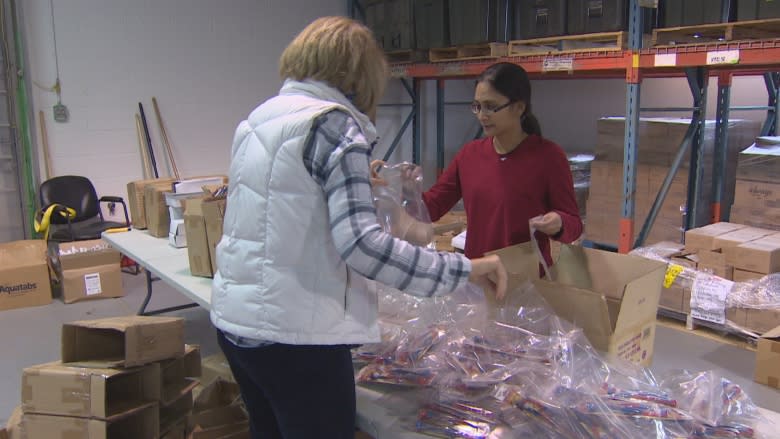Canadian charity prepares over 900 emergency kits for Yemen families amid cholera outbreak
Thirty Toronto volunteers with a Canadian disaster relief charity prepared more than 900 family emergency kits for people in Yemen on Saturday to help combat the country's growing cholera epidemic.
Rahul Singh, executive director of GlobalMedic, said each kit contains a household water purification unit that can provide one family with clean drinking water for a year, as well as hygiene items to protect family members from the risk of communicable diseases.
"There are 800,000 folks plus in Yemen who have been affected by cholera. There's deadly water borne disease that is completely avoidable. We have kids dying en masse," Singh said.
"And we are hoping to save a lot of these kids by getting these families these kits to get them clean water for a year."
Singh said the charity marked Remembrance Day by preparing kits for families currently affected by war.
Kubra Khandwala, a volunteer, said she donated her time and energy because people in Yemen need help.
"The outbreak of cholera is really bad and I don't think enough media attention is being given to this. I think it's really important for people to see that there is a need there and people are being affected. All it takes is clean drinking water," she said.
Kapasi International Relief and Education Assistance, or KIREA, a non-profit charitable organization that Kwandwala runs, raised money to help pay for the kits and she decided to lend a hand with the packing
"It's really important for me to be here today because I need to be working as well on this. I can't just sit back and raise money. I need to be doing something and I think every person who is here is really valuable. Time is what's of value now," she said.
GlobalMedic sent 330 family emergency kits to Yemen in June and enough water purification tablets to provide 6.7 million litres of clean drinking water.
Since April, the World Health Organization has reported more than 908,000 suspected cases of cholera in Yemen and 2,192 deaths due to the disease.
GlobalMedic says the number of suspected cholera cases is expected to reach a million by the end of this year.
According to the WHO, seven million people in Yemen are on the brink of famine. That includes some two million severely malnourished children, living in areas where cholera infection rates are high. Children with acute malnutrition have compromised immune systems that triple their risk of dying from diseases such as cholera.
Last Monday, a Saudi-led military coalition closed all air, land and sea ports in Yemen to stop what it believes is a flow of arms from Iran to Yemen's Houthi movement.
On Saturday, Reuters reported that the coalition has said it will allow international commercial flights to resume to two Yemeni cities starting Sunday.
The blockade came after Saudi Arabia intercepted a ballistics missile last weekend that was fired by Yemen's Houthi rebels at the Saudi capital Riyadh. According to the U.S. military, the missile was from Iran.
Saudi Arabia blamed the strike on Iran, which supports the Houthis but has denied arming them.
The blockade has led to a fuel, medicine, and food crisis in the Yemeni capital Sanaa, where resources are already scarce.
This week, the United Nations warned that the blockade could bring millions of people closer to "starvation and death."




